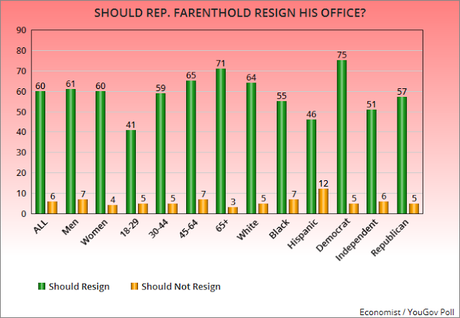 (Photo of Rep. Blake Farenthold is from Crossroads Today at ABC Newscenter 25.)
(Photo of Rep. Blake Farenthold is from Crossroads Today at ABC Newscenter 25.)
One of the more egregious sexual harassers in the U.S. Congress is Rep. Blake Farenthold (who represents District 27 in Texas). He was accused by one of his aides of repeated sexual harassment, and when she complained about it, he fired her. The taxpayers wound up paying the woman $84,000 to settle her claim out of court.
Farenthold tried at first to deny that the claims were true. But now other aides have come forward to verify them. It seems that sexual harassment, laced with repeated temper tantrums, were commonplace in Farenthold's office. Farenthold also tried to avoid repercussions by saying he would repay the $84,000, but that just dodges the real issue -- that sexual harassers and abusers have no place in the U.S. Congress.
Now he is trying a different approach. He has announced that he will not seek re-election in the 2018 midterm elections. That is also unacceptable! It means he will continue to serve in the House for more than another year (until his replacement is sworn in January of 2019).
I am not alone in my demand that Farenthold resign. A new poll (see above) shows that 60% of the public thinks he should resign, while only 6% say he should not resign. And that includes 57% of the Republican base believing he should resign. The public doesn't want sex harassers and abuser from either party serving in the United States Congress. And they are right -- allowing these sex offenders to continue to serve puts a black mark on our government, and gives the impression that such behavior is at least somewhat acceptable.
It is time for his Republican cohorts in Congress to speak up and demand his resignation. So far, their silence has been deafening. They were quick to demand the resignation of Democratic Rep. Conyers for similar behavior (and he did resign). Was that just hypocritical party politics? Shouldn't the same rules apply to members of both parties?
The chart above reflects the results of a new Economist / YouGov Poll -- done between December 10th and 12th of a random national sample of 1,500 adults (including 1,338 registered voters), and has a 3.5 point margin of error.

